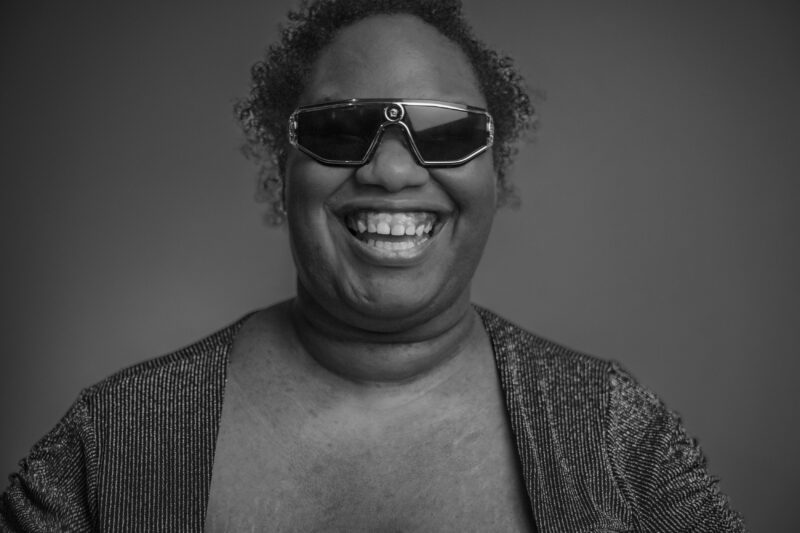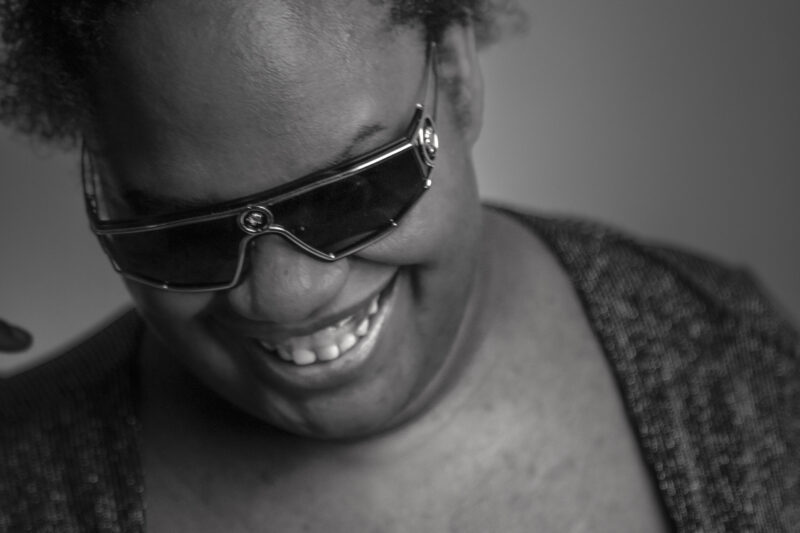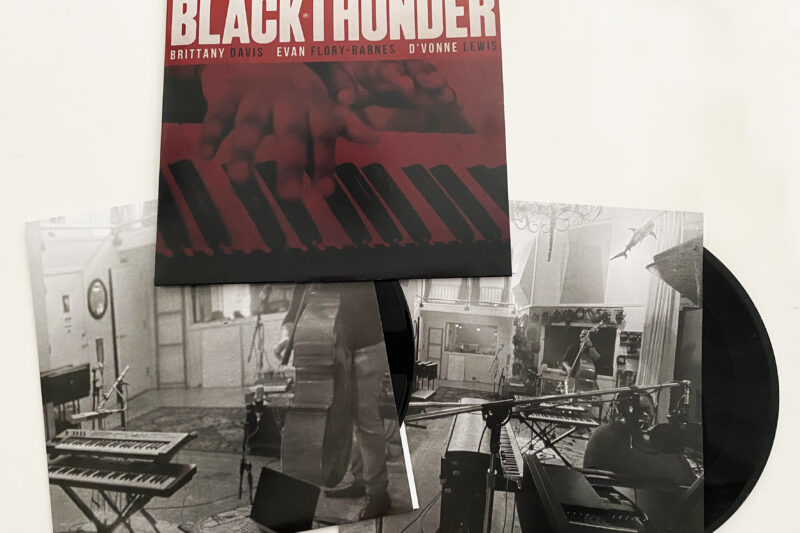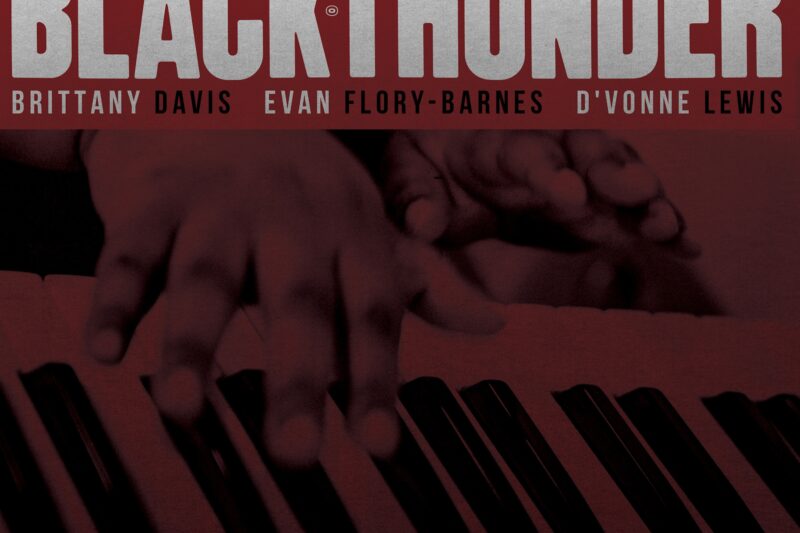Black Thunder is the new studio album by acclaimed Seattle-based artist Brittany Davis. Arriving June 13 on Loosegroove Records, a label founded by Pearl Jam’s Stone Gossard, the profound, fully improvised, fully realized collection, recalls artists like Nina Simone, Roberta Flack and Rahsaan Roland Kirk in its immersive, incantatory spirit. Produced by Josh Evans, it features Davis on keys and vocals, Evan Flory-Barnes on bass, and D’Vonne Lewis on drums.
The trio — who barely knew each other prior to recording together — improvised Black Thunder in a surge of interactive creativity across two days in the studio. The short window in which to work did away with overthinking and brought each musician’s A-game. Steeped in Black and Afrocentric cultural influences, this is Davis’s most poignant and cathartic work to date.
“Brittany, Evan, and D’Vonne have, in some way, been preparing for this recording all their lives. Honing their instrumental craft and ability, of course — but more importantly, preparing their ears, emotions, and egos to be fully present and create absolutely in the moment,” Evans says. “To listen deeply and respond empathetically. To speak with uncomfortable honesty. To listen, and be vulnerable.”
Davis — who has been blind since birth — arrives at Black Thunder via considerable headwinds. In 2023, she released her debut album, Image Issues, also via Loosegroove Records. It was met by critical hosannas. As NPR’s All Songs Considered put it, “Brittany’s music is a potent expression of hope…giving the listener courage to face the challenges the world throws at them.” And American Songwriter hailed her “voice that would fill the deepest cavern. The blind singer/songwriter is a marvel and not for any reason other than she is dripping with talent and presence.” Davis was featured on ABC’s Good Morning America, which noted, “She uses her music to connect with people and fight for a more inclusive world.”
Black Thunder marks a shift away from Image Issues’ contemporary soul-funk sound built upon drum machines and programmed keys; instead opting for a fully live, organic performance, one that showcases her stylistic maturation, pure expression and the breadth of her versatility.
In the opening piece, “All You Get,” Davis introduces herself on the piano with a pensive, one-note octave rhythm; Flory-Barnes joins them with a hypnotic pulse. Lewis completes the triangulation with a shaker, then drums. “The groove is locked in,” Evans says with a smile. “The ceremony has begun.”
At the outset, Davis scats a melodic phrase. But moans, chants, claps, and snaps bring the group heads somewhere else entirely — somewhere deep-set, primed for catharsis. To the notion that “You get what you get/ And don’t throw a fit,” Davis hurls, “I’ll show you what I get / I’ll show you I’ve evolved past all your s— / My evolution has not become flat!”
“She is channeling something or someone else,” the producer adds. “Voices, spirits, the divine — something bigger than the room itself. Something more than just the three musicians playing — something older, something deeper.”
“So many things I’ve never seen / but I’ve touched it all, it seems,” Davis sings in “Amid the Blackout of the Night.” She’s never seen the stars; she’s never seen the sun nor moon; she’s never seen the night. “But how can she somehow still perfectly capture that feeling of looking up into the night sky?” Evans says. “Is there more to seeing than just sight?”
From celestial concerns, Davis pivots to terra firma: the swaggering title track, “Black Thunder,” evokes soil, rain, mountaintops, earthquakes. On “Change Me,” Davis and Flory-Barnes hot-potato a fragmented scale between piano and bass: “Can’t be like this/ Too Black, too fat, and blind all at the same time,” sings a self-disassembling Davis.
“Brit is vulnerable and flawed, and maybe tired of being some kind of griot or action hero,” Evans says. “The stars are beautiful, but sometimes Brit just wants to be skinny and ‘attractive.’ It takes bravery to share that.”
As with the rest of Black Thunder, the spoken-word “Girl (Don’t You Know)” was improvised — albeit massaged and collaged with studio trickery. “It started out as a six-minute, spoken-word freestyle; Brit and I took that piece, chopped it up, and layered it upon itself,” Evans says. The anxious dance of “Girl (Now We’re the Same)” settles into a crepuscular mood.
Within the freestyling “Mirrors,” Davis pits their self-perception against that from outside. “Sarah’s Song” channels an enslaved woman — abused, ignored, forgotten, who had 24 children. The sounds of chains and padlocks evoke the weight of ancestral pain.
After the light-and-dark, push-and-pull “Sun and Moon,” Black Thunder concludes with “…Ancestors.” Apropos to the title, “Brit told me that at different times she felt like the voices of their ancestors were speaking through her,” Evans remembers. “We decided to summon and channel these voices, to connect and comment on the songs, almost like a Greek choir.”
Black Thunder is the work of a sui generis artist charting a course all her own. By bulldozing easy narratives and accessing the realm of pure feeling, Davis’ latest missive is a creative thunderclap destined to resonate across the ages.



